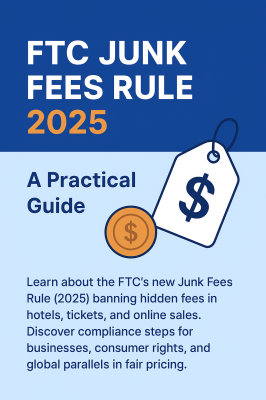FTC Junk Fees Rule (2025): A Practical Guide
Introduction
The U.S. Federal Trade Commission (FTC) has officially introduced the Junk Fees Rule (2025) to ban hidden charges that frustrate consumers and distort competition. This guide explains what junk fees are, how the new rule works, and what businesses and consumers need to know.
1) What Are Junk Fees?
Junk fees are hidden or mandatory charges added without clear disclosure. Examples include:
-
Hotel resort fees not shown in the advertised rate.
-
Ticketing service charges added at checkout.
-
Airline seat selection fees.
-
Extra online checkout costs.
They mislead consumers by hiding the “real” price until the last step.
2) The FTC’s New Rule (2025)
The FTC Junk Fees Rule requires businesses to display the total price upfront, including all mandatory fees. It applies to:
-
Hotels & accommodations
-
Event and concert tickets
-
Rental housing platforms
-
Online marketplaces & e-commerce
-
Travel and airline services
Optional add-ons (like upgrades) may still be charged but must be clearly disclosed before purchase.
3) Timeline & Enforcement
-
Effective date: 2025 (staged rollout).
-
Penalties: Thousands of dollars per violation.
-
Enforcement focus: Industries with high consumer complaints — especially ticketing and hospitality.
4) Business Obligations
Businesses must:
-
Show the full price at the point of sale.
-
Clearly mark optional vs. mandatory charges.
-
Eliminate “drip pricing” (revealing costs only at the last step).
Non-compliance may trigger FTC fines and consumer lawsuits.
5) Consumer Rights
Consumers now have the right to:
-
See full, upfront pricing before purchase.
-
Request refunds for undisclosed junk fees.
-
File complaints with the FTC via online forms or hotlines.
This rule empowers consumers and encourages trust in the marketplace.
6) Impact on Small Businesses
Small businesses in e-commerce, hotels, and event management must adapt pricing practices. While compliance requires website updates, staff training, and system changes, transparent pricing reduces disputes and increases credibility.
7) International Comparisons
-
European Union (EU): Laws already require transparent pricing in digital and travel sectors.
-
United Kingdom (UK): The CMA (Competition and Markets Authority) enforces similar rules against hidden fees.
The U.S. rule aligns with this global movement toward fair pricing.
8) 90-Day Business Action Plan
Days 1–30: Audit all products/services for hidden fees.
Days 31–60: Update websites, checkout pages, and invoices to show full pricing.
Days 61–90: Train staff, launch compliance monitoring, and prepare documentation.
9) Conclusion
The FTC Junk Fees Rule (2025) is a landmark consumer protection law. Businesses must adapt quickly, while consumers benefit from transparent and fair pricing. Globally, this reflects a shift toward accountability and fairness in digital and retail markets.
